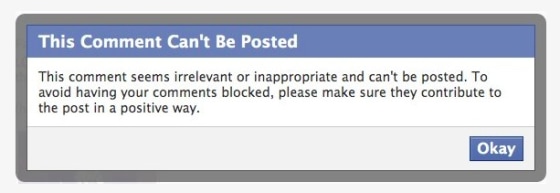If you've been flummoxed over the last few months over Facebook prompts telling you that your comment is "irrelevant or inappropriate and can’t be posted," you're not alone. The same thing happened to famous tech blogger Robert Scoble over the weekend, causing commenters to toss around the very touchy "censorship" word. Which is good news for you!
Given Facebook's penchant for addressing consumer complaints only when those complaints gets major media attention, we now have a better idea on why this is going on.
Robert Scoble, the well-known tech startup enthusiast, went to post a comment on a Facebook post written by Carnegie Mellon student (and TechCrunch commenter extraordinaire) Max Woolf about the nature of today’s tech blogging scene. Scoble’s comment itself was pretty par-for-the-course — generally agreeing with Woolf’s sentiments and adding in his own two cents.But when Scoble went to click post, he received an odd error message:"This comment seems irrelevant or inappropriate and can’t be posted. To avoid having comments blocked, please make sure they contribute to the post in a positive way."
Odd perhaps, but the error message isn't unusual to many Facebook users. Dating back to the time last year that the social network added the "subscribe" option, people have been getting blocked by this glitchy comment-curating algorithm.
Unlike non-famous tech blogging users however, Scoble quickly got a response from Facebook over what he described as his "comment censorship issue." A Facebook spokesperson explained that Scoble's comment received a "false positive" as spam," Scoble writes on his Google+ blog.
Facebook explains it to the rest of us in this official statement following the the Scoble kerfuffle:
To protect the millions of people who connect and share on Facebook every day, we have automated systems that work in the background to maintain a trusted environment and protect our users from bad actors who often use links to spread spam and malware. These systems are so effective that most people who use Facebook will never encounter spam. They’re not perfect, though, and in rare instances they make mistakes. This comment was mistakenly blocked as spammy, and we have already started to make adjustments to our classifier. We look forward to learning from rare cases such as these to make sure we don’t repeat the same mistake in the future.
Facebook offered a link to additional information on its spam prevention system.
Why does Facebook need an algorithm patrol comments for spam?
Let's consider the subscribe button, which allows Facebook users who've reached the 5,000 friend limit gather more followers Twitter-style. (Facebook fun fact: It was Scoble who famously made the first big stink back in 2007 about the 5,000 friend limit.)
The Facebook subscribe button, good for celebrities and journalist types, allows popular users to curate their posts, deciding if a post can be seen by "friends" or everyone, including subscribers. Depending on how closely Facebook users curate their comments, this does leave the door open for spam. Here's how Scoble says the Facebook spokesperson broke it down:
The PR official I talked with told me that the spam classification system has tons of algorithms that try to keep you from posting low-value comments, particularly to public accounts (er, people who have turned on subscriptions here on Facebook). I actually appreciate that Facebook is trying to do something about comment quality. I had to recently change my privacy settings to only allow friends of friends to comment on my posts because I was getting so many poor comments on my posts (when I did that the poor quality posts instantly stopped).The PR person also said that a team is looking into why this message got a false positive, and will be adjusting the algorithms to let messages like these get through the system. Also, the error message made it sound like the message was blocked because of the content of the message, not because it looked spammy. They are looking into the wording of the error and will update that to make the error clearer as to what's going on and why the spam classification system got kicked in.
So thanks, Robert Scoble! Media attention is, historically, a Facebook user's best bet at getting such social media injustices rectified — what with Facebook not having an 800 customer service line and all.
That said, Scoble describing Facebook's ham-fisted spam filter as a "comment censorship issue," causing others to echo the accusation, is a bit much coming from a guy who admits to straight-up blocking his 240,000 subscribers from commenting because he "was getting so many poor comments" on his posts. After all, if it's not censorship to automatically limit the amount of discussion that can be had in your own Facebook channel, why is it when Facebook does a comparatively limited version of the same, on a thousand times larger scale?
Helen A.S. Popkin goes blah blah blah about online privacy, then asks you to join her on Twitter and/or Facebook. Also, Google+. Because that's how she rolls.
